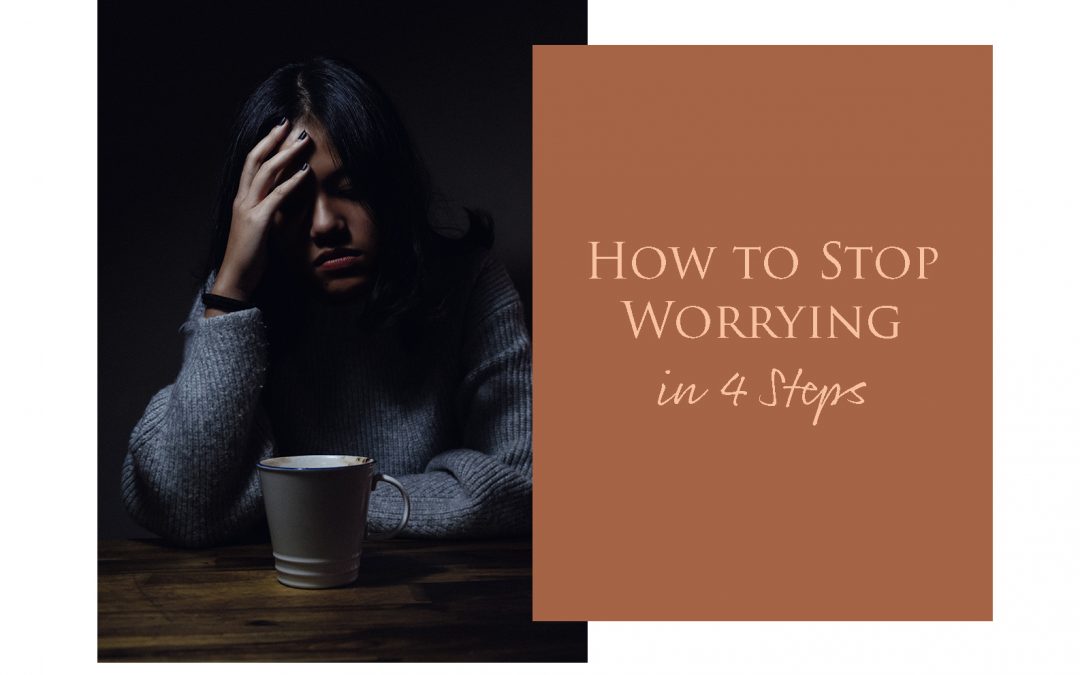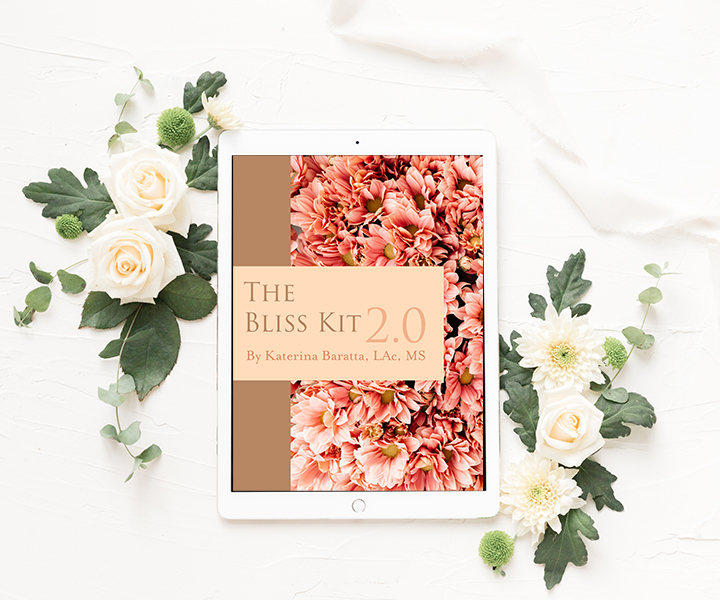How to Stop Worrying
In this article we will explore the following questions:
- What is worry?
- Where does it come from?
- How is worry related to what’s going on in your body?
- Is there anything you can do to help you stop worrying?
(Spoiler alert: Yes, there are a bunch of strategies you can use to stop worrying.)
And I’m going to teach you 4 of them in this article.
But please don’t just skip down to the end of this article to find out what they are!
Before you can really use those strategies, you have to understand the why behind the what.
The “why” is the secret sauce.
Because if you don’t know why you’re using these strategies, you’ll just be going through the motions.
There’s a lot more power in action that’s supported by understanding.
You’re also more likely to stay motivated and follow through when you know why you’re doing what you’re doing.
So if you want to learn how to stop worrying, read on.
Because this article might be just the medicine you’ve been looking for.
“Hallo Katerina?” My Austrian grandmother’s voice was an octave higher than usual.
After some 70 years of cigarette smoking, she usually had more of a croak than a chime in her intonation.
But this time her voice was distinctly high-pitched.
“Grossmama?” I answered confused.
These were the days before WhatsApp or Skype.
International calls were expensive back then, and she had a hard time reading the numbers on a calling card, so I was normally the one to call her, not the other way around.
Something was clearly up if she was calling me.
“Is your mother ok?”
“Uh…I think so? Why wouldn’t she be, did something happen?
“I was supposed to talk to her this morning and I can’t reach her.”
Ah. I understood.
Worry had taken over and she couldn’t see past it.
My heart skipped a beat.
By nature I’m a very empathetic person.
I feel other people’s emotions and sometimes can’t tell that they’re not my own.
Coming from a long line of worriers, when I was growing up I often felt overwhelming stress in response to my caregivers’ concerns, even when I had no past experience to inform those feelings myself.
So my body tensed up automatically when I heard the worry in my grandmother’s voice.
Rationally I knew there was probably some explanation, but what if something really had happened?
My mind started to race right along with my heart.
Fast forward through a few more phone calls and a check-in with a neighbor.
It turned out that my mother was fine.
She had been running errands, lost track of time, and her phone was buried on vibrate at the bottom of her purse.
And that’s the usual story with worry.
Reality almost always proves our worries wrong.
But reality doesn’t derail worry from rolling in like clouds during hurricane season if you’re a worrier.
And my mother and grandmother were chronic worrierers.
Hurricane season was all year long for them and they were always on high alert.
Their minds regularly wandered into the future, looking for any potential threats they could find, hoping to worry their way out of whatever pain might be lurking around the next corner.
And their habit of worrying served as training grounds for me, shaping how I would later come to view the world.
Subconsciously, I was being fed the false belief that worrying was there to protect me.
This is one of the biggest misconceptions people have about worrying.
Worriers imagine that worry is useful.
They imagine that if they worry enough, they might be able to avoid some future calamity.
But worry is never useful.
Because the things you worry about never happen in the present.
Worry is always a projection into the future.
But the only place you have any power to do anything is right here, right now, in the present moment.
No matter how much you try to worry your way out of potential discomfort, the only thing you’re actually doing when you worry is bringing the discomfort you’re so afraid of in the future into your present experience.
In my family, worry was wielded as a token of love.
The unspoken belief was that if you worried about someone, it meant you loved them.
If you didn’t worry, it meant you didn’t care.
But that’s not true either.
You can love someone and be concerned for them without worrying.
Concern allows you to see things as they are and take action where you can.
But worry is powerless.
In fact, worry is only evidence of attachment, which is not love.
Attachment is an inability to accept life as it is and therefore an attempt to stop life from flowing.
True love is found in acceptance, not attachment.
My mother and grandmother didn’t know this.
They were weighed down by worry because they didn’t know that they could still be good and worthy and loving without worry.
And they didn’t know that they had permission to change it.
Through their example I learned how to become an expert worrier myself.
But through some grace, I eventually realized that worry is a choice.
I learned what worry really is, where it comes from, and how to support myself as I explored a new way to be in the world, without worry.
My hope is that my work and this will help you do the same.
What is worry?
At the most basic level, worry is a defense mechanism that attempts to protect you from pain.
It’s a projection of past experience into a future that is unknown.
This means that worry is purely a figment of the imagination.
It’s never based in the reality of the present moment.
If there were a problem in the present moment, you’d deal with it in the present moment.
You can’t deal with the future until you get there.
Which means there is absolutely no power in worry.
But your body doesn’t know the difference.
Studies have shown that whether you’re imagining something or actually experiencing it, your body responds the same way. 1
When you’re worried about worst-case scenarios, your nervous system gets activated as if the worst case scenario were actually happening in front of you, the present moment.
But because it’s all in your mind, there’s no action you can take to fix the situation.
So you keep grasping for something that isn’t there, and your nervous system stays on high alert.
You end up feeling totally out of control, and this only makes worry worse.
What’s the only thing that actually is within your control?
To stop worrying.
Where does worry come from?
According to Bréne Brown (from her brilliant book, Atlas of the Heart,
which should be required reading for all humans who feel anything, ever,) worry is a coping mechanism that arises in response to anxiety.
And anxiety is a response to stress.
From a psycho-spiritual standpoint, worry is the Ego’s fearful attempt to control the uncontrollable.
Ego is how you identify yourself.
Every thought that you have about yourself, your name, your body, your past and your future, all falls under the Ego’s umbrella.
It gives you the perspective that you are separate from the Whole.
While this is partially true, it’s a perspective that’s extremely limited.
And dissolves the moment you zoom in.
So let’s zoom in to illustrate this point.
If you’re like most people, you identify yourself with your body.
You don’t necessarily say “my body,” you just assume it is you and you assume your identity is a stable and individual entity.
This is the Ego’s illusion.
In reality, your body is inextricably linked to everything that appears to be outside of it, and it’s continually changing, moment by moment.
Every time you breathe in or out you are literally changing the molecules that are in your body.
You are pulling the air that is around you into your body so it becomes part of your body, and breathing air out of your body so it becomes part of the atmosphere.
So with every breath, your body is already changing.
This happens so naturally and automatically that you don’t give it any thought at all.
Ok, so your body changes.
But surely you remain the same?!
No, not really.
At least not the way you think you do.
Flash back to the first day of 7th grade.
What were you excited about?
What were you afraid of?
What was your favorite food?
Who were your friends?
I’m going to guess that the majority of your answers have changed a few times since then.
Your body has changed.
Your social status has changed.
Your likes and dislikes have changed.
Your name might have even changed!
So your identity has totally changed, yet you still claim to be the same individual person.
Your True Self is still present through all of this, yes.
That’s the part of you that was never born, cannot die, and isn’t personal.
But that’s not your Ego.
The Ego likes to imagine itself (who you think you are) as a stable and separate entity, but it’s not.
It’s constantly subject to change.
And the bigger Truth is that it’s more connected to everything outside of it than it is individual.
But the Ego doesn’t like to hear this.
It clings to the illusion of separateness and stability.
More than anything, the ego doesn’t like change.
Because change means death to the Ego as it currently thinks about itself, and by definition all the Ego is is thought.
And this is what leads to worry.
You find yourself worrying about what might change as an attempt to keep everything the way the Ego imagines you and life are “supposed” to be.
But in reality, life is supposed to change.
Life is change.
Without change there can be no life.
But it’s the resistance to change that causes worry.
It’s the resistance to change that causes suffering, not the change itself.
How is worry related to what’s going on in your body?
From a biomedical standpoint, worry starts in the nervous system.
And it happens because your body is biologically wired for survival.
At the most basic level, all of your thoughts are conditioned from your past experiences to help you make sense of your current circumstances so you can try to control what’s happening.
This makes you (and most people in a human body) supremely uncomfortable with uncertainty.
Because uncertainty means that you’re not in control.
Uncertainty means that there’s the potential that things will change.
And you know from past experience that when things change, there’s also the potential that those changes will hurt.
The awareness of this pain potential activates your sympathetic nervous system.
Cortisol and epinephrine flood into your system.
Your heart rate goes up.
Blood rushes out of your organs and into your muscles.
Your whole body tenses up on high alert.
In other words, uncertainty stresses you out.
And worry is one of the ways your mind deals with this stress.
But worry is a really ineffective strategy.
All it does is cause more stress in your body, which only leads to more worry.
The more you do it, the worse it gets.
Because your nervous system gets wired through repeated experience.
Every time you think or do something, you strengthen the connections in your nervous system that correspond to that thought or action, and the easier it is for you to repeat that thought or action in the future.
So the more you worry, the more you worry.
That’s the biomedical side of the story.
But there’s more to it.
Chinese medicine theory is also really helpful when it comes to understanding where worry comes from— and how to heal it.
According to Chinese medicine, all emotions arise in response to how energy is flowing through your body.
And worry is both a cause and a consequence of imbalance in the Earth organs.
The Earth organs are responsible for digestion.
They transform and transport food and drink so it can turn into a form of energy that the body can use.
But Earth is also symbolic for other aspects of life.
Earth is associated with a sense of home, belonging, comfort, groundedness and stability.
It’s related to the ability to stay balanced, even as life changes everything up around you.
Worry is the opposite of this.
Worry is the feeling of instability, insecurity, and ungroundedness.
Worry is totally uncomfortable and unsettled.
Basically, it’s the inability to digest and integrate what life is offering you in a way that you can use it.
And it’s not just in your mind, or even your nervous system.
I haven’t met a worrier in my practice who doesn’t also have digestive troubles of some kind.
Because when your digestion isn’t working optimally and your body isn’t getting what it needs to function properly.
Whether you realize it or not, weak digestion is stressful.
It affects the sense of stability within your body, and this can lead to worry.
And it goes both ways.
If you spend too much time thinking and worrying, all of your vital energy is focused in your head instead of your body.
And with all of that vital energy swirling around in abstract thought, your body (which is literally made of earth) isn’t getting the energy it needs.
The coolest thing (to me) about all of this Chinese medicine theory is that there’s science to back it up.
Because as we know, worry is a response to stress.
And when you’re stressed, your parasympathetic nervous system’s rest and digest mode is turned down while your sympathetic nervous system takes charge.
So it turns out the ancient sages in China were spot on when they made the connection between digestion and worry.
Because that’s exactly what happens.
How to Stop Worrying in 4 Steps
“That the birds of worry and care fly over your head, this you cannot change, but that they build nests in your hair, this you can prevent.”
1. Remind Yourself of the Truth.
Most worriers have 3 misconceptions that keep them trapped worrying.
The first misconception worriers believe `is that worry is useful.
But worry is never useful.
All it does is heighten your sense of anxiety, which clouds your ability to take appropriate action where you can.
“If a problem is fixable, if a situation is such that you can do something about it, then there is no need to worry. If it’s not fixable, then there is no help in worrying. There is no benefit in worrying whatsoever.”
The second misconception is that worry can help you avoid pain.
But worry doesn’t reduce pain.
If anything, worrying increases suffering by pulling the experience of potential future pain into your current reality in the present moment.
“We can easily manage if we will only take, each day, the burden appointed to it. But the load will be too heavy for us if we carry yesterday’s burden over again today, and then add the burden of the morrow before we are required to bear it.”
And the third misconception is that worry is a sign of love.
It’s not.
You can love someone and be concerned for them without worrying.
If you’re struggling with any of these misconceptions, go back and re-read the first part of this article.
Because none of these beliefs are true.
And the more you remind yourself of the truth when you’re worried, the easier it’ll be to let your worries go.
“The voice in your head also creates a huge amount of problems that aren’t really problems. They’re just things that haven’t happened yet, things that could happen tomorrow or next week. Listening to unreal problems has another name: worrying. That’s what the voice in your head does. It what-ifs. It frets. It agonizes, and you can no longer sense the joy of life.”
2. Practice Presence.
Worry happens when you project your thoughts into an unknown future.
So the more you are able to focus on the present, the less worried you feel.
But this takes practice.
As a worrier, you’ve spent years training your mind to time travel instead of being fully present with what’s actually in front of you.
You’ve got to break this habit and form new neural networks if you want to stop worrying.
This means it can take time to teach your mind to be present.
But presence is a muscle that can be trained and strengthened.
The more you practice, the easier it gets.
To begin, I recommend intentionally setting aside some time every day to do one or two activities with as much presence as you can.
When you notice that your mind has wandered (and it will!) just gently bring it back to the experience of the present moment.
Limit interpretation as much as you can.
Just keep coming back to what’s happening, right here, right now.
You can watch it happen without “doing” anything.
For example, washing dishes: your hands know how to wash the dishes without you explicitly telling them to put soap on the sponge and turn the water on.
Your body just kind of does all that on its own.
All you have to do is watch it happen.
Over time, this practice will drastically change your life experience for the better.
And just like any other thought, when worry takes hold you’ll have a much easier time letting it go.
3. Support Your Digestion
Here’s what healthy digestion looks like:
Healthy digestion means 1-2 well-formed bowel movements per day that feel complete, without straining, gas, bloating, or other discomfort.
Anything else means your digestion could use some support.
Worrying almost always comes with digestive trouble, but there are many things you can do to support your digestion so your body and mind have less to chew on.
I recommend eating kitchari to all of my patients because of its incredible ability to heal digestion.
The ingredients I recommend change a bit depending on what’s going on for the person I’m working with, but if you use this basic recipe by Kate O’Donnell you can’t go wrong.
Tea made with fresh ginger is another remedy I recommend to my patients regularly.
And you can doctor up the healing power even more by adding turmeric and black pepper.
But kitchari and fresh ginger tea are just a starting point.
There are a lot more ways to use food as medicine than I can put into this article, and a lot of it comes down to finding the right foods to balance your personal constitution.
If this is something you’d like to learn how to do, send me an email now to set up a free consultation.
4. Boost the vital energy with the 3 Treasures QiGong Practice.
The 3 Treasures Qigong practice is a powerful practice that helps to remove stress blockages from your body and promote healing.
But it doesn’t just have a positive effect on your physical body.
Qigong is some of the most powerful medicine I’ve ever come across for mental health, and I recommend it to every patient who is ready to take their healing into their own hands.
The 3 Treasures Qigong meditation practice in particular can really help you let go of whatever it is that’s holding you back, including your habit of worrying.
But just like rewiring your nervous system, it takes consistent practice to see results.
So challenge yourself to do the 3 Treasures Qigong practice for 30 days.
Even just 3 minutes done consistently can add up to incredible results.
I can’t wait to see where this takes you!
Do you want to learn how to heal your mental health challenges holistically?
Then contact me now to set up a (free) consultation and find out if holistic mental health coaching is right for you.
Please keep in mind that I have very limited availability.
So even if this is something you’re just curious about pursuing in the future, I encourage you to get in touch so you can get on the wait-list and be the first to find out when there are openings in my schedule.
And remember, I don’t accept everyone as a patient.
The consultation serves as an interview for both of us to see if we’re a good fit.
If I think you’d be better served elsewhere, I will try to help you find the resources that can support you.
I hope to hear from you soon!





